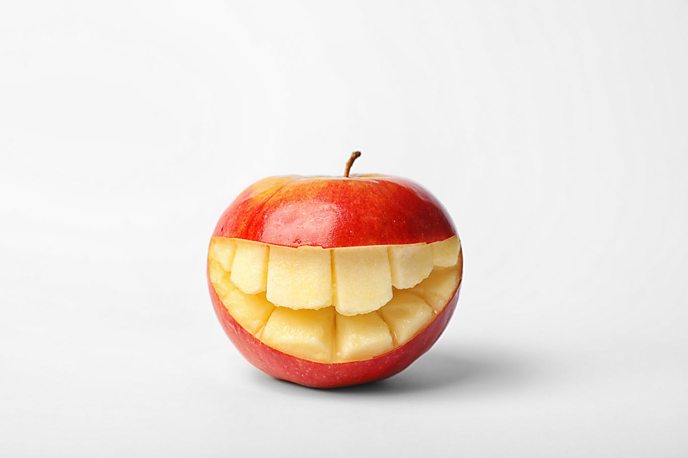According to the NHS, most adults in the UK have gum disease to some degree, and most people experience it at least once. It’s caused by a build-up of bacterial plaque on the teeth. Some of this is harmless, but some, such as Porphyromonas gingivalis, can damage the gums and cause inflammation.
We ask the experts whether our eating habits can make a difference to our dental health, and what you can do to keep your mouth healthy.
Your essential daily tooth-care routine
Getting your basic oral hygiene right is the first step towards good dental health. We all know brushing twice a day is recommended. But what about flossing? And should you brush before or after eating?
“Some like to brush first thing to remove plaque before eating. Some prefer after breakfast. But if you brush after breakfast, we say to wait 30 minutes because if you’ve eaten something acidic or sugary the enamel on your teeth will be softened, and you need to allow it to start to re-mineralise before brushing,” says Sakina Syed, a hygienist for Bupa Dental Care.
“We generally say you should brush last thing at night and one other time, which is often in the morning. The last thing in your mouth at night should be toothpaste, so clean between your teeth with floss or interdental brushes, then brush, then spit out the excess and leave the rest on the teeth to protect them overnight.”
Should you change your diet?
It’s well known that foods high in sugar are bad for teeth. But what other foods can cause problems? And should you eat foods high in certain vitamins and minerals to maintain your dental health?
“The most important vitamins are vitamin D for teeth and vitamin C for gum health, and the important minerals are calcium and phosphorus,” explains Anna Groom, BDA spokesperson and registered dietitian.
“Vitamin C is involved in collagen synthesis and therefore maintaining healthy tissues. It’s important for healing, and severe deficiency is associated with bleeding gums.
“Vitamin D is essential to enable the body to retain sufficient calcium for bone and teeth health. Phosphorus works in conjunction with calcium to maintain tooth health.”
Vitamin C deficiency is rare, but if you aren’t getting enough from your diet it’s easy to increase your intake. Tomatoes, peppers, broccoli and even potatoes are just some of the ingredients high in vitamin C. It’s harder to get vitamin D from foods – while it’s in oily fish, eggs, meat and fortified foods, The NHS advises that most people in the UK consider taking a supplement during autumn and winter.
Good sources of calcium include dairy, fortified dairy alternatives, broccoli and some leafy greens, oranges, fortified tofu and fortified bread. Phosphorus is in meat, eggs, nuts, dairy, wholegrains and dried fruit.
In April, a small study found more nutrients than vitamin C affect gum health. The eight-week randomised controlled study split 30 people into two groups based on their plaque levels. The experimental group followed an ‘anti-inflammatory’ diet, reducing animal proteins and processed carbohydrates and increasing omega-3 fatty acids, vitamin C, vitamin D, antioxidants, plant nitrates and fibres. This group displayed a significantly higher reduction in gum inflammation and bleeding compared to the control group. It’s a small study, and more research needs to be done before definitive conclusions can be reached.
“We advise a balanced diet, including leafy greens, nuts and other vegetables,” says hygienist Syed.
Foods and drinks to avoid
In addition to sweetened fizzy drinks and foods high in refined sugar, these are some of the worst (and sometimes surprising) culprits for damaging teeth:
- Lemon in hot water – erosive for tooth enamel.
- Dried fruit – sticks to the teeth and is difficult to remove.
- Crisps – stick to the teeth.
- Some fruit teas – can be high in sugar.
- Sparkling water – the gas makes it more acidic, so it should be saved for mealtimes.
- Fruity snack bars – stick to the teeth.
- Fermented foods – normally acidic and therefore erosive.
If you eat or drink any of the above other than at mealtimes, you can mitigate damage by rinsing with water afterwards, chewing sugar-free gum or (our favourite tip) eating a small piece of cheese, which has a neutralising effect.
Dangers of snacking
Every time you eat something sugary or some foods high in starch, the PH level in your mouth drops, becoming more acidic as the bacteria feeds off the sugars and releases acid. So if you’re snacking every half an hour, your teeth aren’t getting a break from the acidic environment, which will lead to tooth decay.
“If you’re constantly snacking on these foods, your teeth will quickly develop cavities as the acid produces holes,” says the British Dental Association’s scientific adviser, Professor Damien Walmsley.
Unfortunately, these foods include whole fruit. “If you are grazing on fruits high in natural sugars throughout the day, it will still increase your risk of decay,” says hygienist Syed.
It’s best to limit snacks to two or three a day, and save sugary or acidic foods and drinks for mealtimes.
“During mealtimes, chewing food increases the production of saliva, which is alkaline and acts as a buffer to dilute sugary or acidic foods and drinks. Stimulation of saliva production at mealtimes washes harmful acids and food particles away from teeth and helps neutralise acid, protecting them from decay,” says Walmsley.
How to care for your teeth
“From a dental point of view, the things that affect oral health are a change in bacterial environment and diet. Tooth brushing and interdental cleaning (such as flossing) should come together – so ensure you do both things. This will help to change that bacteria,” hygienist Syed concludes.
BBC
More about: eatinghabit
















































